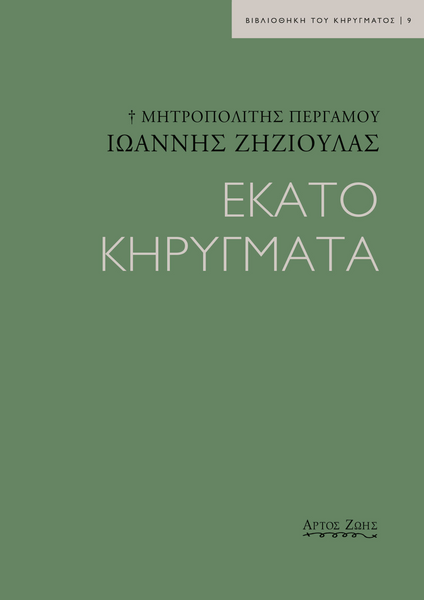Zizioulas Ioannis (Metropolitan of Pergamon)

Ioannis Zizioulas was born in the Kozani Refuge and completed his general studies in the city of Kozani. He was first admitted to the Theological School of Thessaloniki and after two years of studies he transferred to the Theological School of Athens, where his family settled. Immediately after his graduation, he studied at the Ecumenical Institute of the World Council of Churches (WCC) in Bossey, near Geneva, Switzerland. In this Institute he came into first and direct contact with the theology of the other Christian confessions of the West.
After receiving a PSE scholarship, he is doing postgraduate studies (Master's and PhD) at Harvard University in the United States of America. At Harvard, Ioannis Zizioulas had the privilege of studying with distinguished professors, such as Paul Tillich of systematic theology, the late Orthodox theologian of the Russian diaspora Georgios Florovsky of patristic theology, the classical philologist Werner Jaeger, etc. At Harvard, he took up the Christology of Saint Maximus the Confessor as his thesis topic. He was a partner of Harvard's Foundation for Byzantine Studies, known as Dumbarton Oaks, where he was chosen as a fellow and remained for three years. In this international radiation scientific center he collaborated with prominent personalities of the academic community. At the same time, Ioannis Zizioulas collaborated with the Greek Orthodox School of Theology of the Holy Cross in Boston, where he taught Church History of the first three centuries, and with the Theological Seminary of Saint Vladimir in New York, where he taught Canon Law of the early Church. Then, he returned to Greece and submitted his doctoral thesis to the University of Athens on "The unity of the Church in the Eucharist and the bishop during the first three centuries", which was approved with honors in 1965.
During the period 1966-67 he worked as a research assistant at the Theological School of Athens. In the summer of 1967, he was appointed as the Secretary of the "Faith and Order" Department of the PSE, where he remained until 1970. In Geneva, Ioannis Zizioulas came to the center of theological ferment on an inter-Christian level and was active in the formulation of theological programs, being responsible for the organization of international conferences on ecclesiological issues of ecumenical interest. At the same time, he often taught as an invited speaker at the Postgraduate Institute of Ecumenical Studies of Bossey, whose director at that time was the late professor Nikos Nisiotis.
In 1970 he was elected associate professor of dogmatic theology at the University of Edinburgh in Great Britain, where he remained for three years. In 1973 he was elected professor of systematic theology at the University of Glasgow, a position that was given to him for reasons of international recognition of his scientific contribution.
A particular characteristic of his teaching in Great Britain is the comparison of the Western with the Orthodox tradition, as well as the projection of Orthodoxy in the West. Having long had the desire and desire to teach in his homeland, in 1984 he was transferred as a professor of dogmatic and symbolic theology at the Aristotle University of Thessaloniki, where he would teach until his retirement in 1998.
Meanwhile, in 1986, he was elected and ordained "athroon" as a high priest as acting Metropolitan of Pergamum, taking on a more active role as the representative of the Ecumenical Patriarchate in Orthodox and inter-Christian relations. Teaching at the same time in Glasgow until 1987, since 1989 he has been a permanent visitor
professor at King's College, University of London. In 1993 he was elected a regular member of the Academy of Athens. In the fall of 2000, he took over as Director of the newly established Representative Office of the Ecumenical Patriarchate in Athens. In 2002 he was elected President of the Academy of Athens. In 2014 he resigned from the position of Director of the Office of the Ecumenical Patriarchate in Athens and his province was personally elevated to the rank of Elders
Metropolis.
He taught as a visiting professor at the Gregorian University of Rome, as well as at the University of Geneva, while lecturing at many universities in Europe and at the Institute of Orthodox Theology of Balamad University in Lebanon. Over a hundred doctoral theses and diploma theses have been prepared on his work abroad, while the bibliographic reviews and references to his work internationally amount to a very large number. He is a member of the International Academy of
of Religious Sciences (Académie Internationale des Sciences Religieuses), of the Institut des Sciences Théoriques (classe des sciences sacrées) of Brussels and partner of the Academy of Theological Studies of the Holy Metropolis of Dimitrias. He is also an honorary doctor of the Catholic Institute of Paris, the Theological School of Belgrade, the Saint Sergius Institute of Paris, the Orthodox Theological School of Babes-Bolyai University in Cluj-Napoca, Romania, the Catholic Theological School of the University of Münster, the Theological School of of Milan and the Department of Orthodox Theology of the University of Munich. The Metropolitan of Pergamon is president of the Pan-Orthodox Pre-Synodal Conferences, president of various Theological Dialogue Committees
and adviser to the Ecumenical Patriarchate, president of the Orthodox Committee for the Protection of the Natural Environment and the corresponding one for Bioethics, member of the Central Committee of the PSE (1975-1983) and the "Faith and Order" Committee, and representative of the Ecumenical Patriarchate in General Assemblies of the World Council of Churches (Uppsala 1968, Nairobi 1975, Vancouver 1983, Canberra Australia 1992).
Over a hundred are the published studies of the Metropolitan of Pergamum in Greek and - most of them - in the three main European languages, without taking into account the various texts of bilateral theological dialogues on which he worked as an editor. His works have also been translated into Italian, Romanian, Spanish, Serbian, Russian, Japanese and Chinese.








